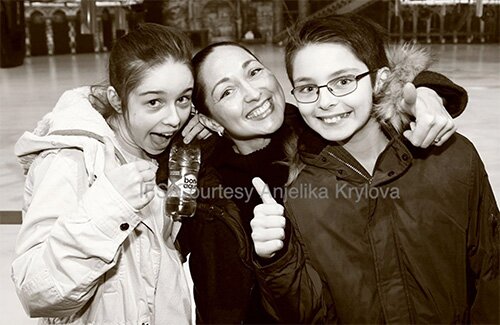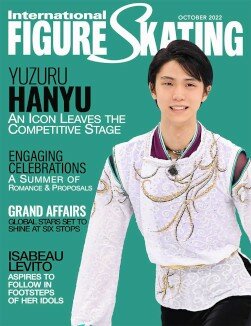

One year ago, Anjelika Krylova, the two-time World ice dance champion (1998-1999) and the 1998 Olympic silver medalist with Oleg Ovsyannikov, returned to her Russian homeland after living and working for 24 years in the U.S.
Krylova, who moved to Moscow with her children Stella, 14, and Anthony, 12, wanted to start a new skating school. Together with colleague Oleg Volkov, she achieved that goal and is now based at the Megasport Sport Palace where she is coaching — among others — the 2019 Winter Universiade champions Betina Popova and Sergey Mozgov.
“The first year went very well, I think. It was productive,” said Krylova, 45. “I tried to get into the Russian way and I think I did. The system is very difficult and it is different from the system I worked in before in America.
While training in the U.S. is focused more on individual sessions, in Russia it is based more on a group system. Also, the skating schools in Russia are government run and come with all the advantages and disadvantages that system has, while the clubs in North America are usually commercial enterprises.
For Krylova, who had never previously coached in Russia before, it was a complete switch from one system to the other. “In general, all the parameters of how a sports school works are completely different. There are different obligations, but I think I dealt with it well,” she said.
Krylova and Volkov have two groups — one for senior and junior level skaters, and a younger group dedicated to novice teams and ice dance beginners. Currently, there are about eight teams in the senior group and nine in the younger group. The seniors and juniors mostly train at Megasport, a rink located not far from central Moscow that is used for competitions such as Rostelecom Cup, while the younger teams train in the speed skating oval at Ice Palace Krylatskoye on the outskirts of the Russian capital.
Krylova spends her days going back and forth between the two rinks. “It is a bit difficult with the schedule and we are trying to arrange it so that practices take place always at the same time because right now this is not the case,” she explained. “I try to do the best I can with these conditions at this time.”
When Krylova returned to Russia, she was happy to be able to open a school and get the right conditions to work, even though the situation in Krylatskoye is not ideal with the ice surface being in the middle of the speed skating oval.
Additionally, some speed skaters that train there feel disturbed by the music of the ice dancers, which has led to some conflicts. “When I came here a year ago I wasn’t in a position to dictate my conditions. I was just very grateful that I was able to open a school and got these great conditions right in the center of Moscow,” Krylova said. “I’m very grateful to the Megasport school that they do what they can and give me these opportunities and help when there are problems. They react with understanding. Now that I have gotten into the system, I feel more confident and comfortable.”
“We have a very good coaching team nd we have students at all levels, starting with basic novice up to seniors,” Krylova explained. “I’m working with Oleg and others, and there are always other people coming in.”
Two of those people are two-time World ice dance champions Albena Denkova and Maxim Staviski, who represented Bulgaria during their career. They work as choreographers on a regular basis with the ice dance teams. “At first I had a lot of skaters, then some left and now again there are many,” said Krylova. “That makes me enthusiastic that I’m doing some things very well and people want to work with me. There are so many teams that I even have to turn down some because I need the space for my main teams, so that they have music time and my attention.”
Krylova’s return to Russia was not a spontaneous decision. Rather, it was something she had been thinking about for a long time. The Russian Figure Skating Federation invited her to return before the 2014 Olympic Winter Games in Sochi, but Krylova said she was not quite ready at that time to make the move. Though she was interested in the proposal offered to her, she thought everything through over the five- year interval and weighed all the options.
At that time, Krylova and her former husband, Pasquale Camerlengo, were successful coaches in Detroit and counted among their students many champions, including Canada’s Kaitlyn Weaver and Andrew Poje and Kaitlin Hawayek and Jean-Luc Baker of the U.S. But, Krylova always missed Moscow and the Russian lifestyle. Another important factor in the decision making process was her family. On one hand, Krylova wanted to be closer to her mother, who lives in Moscow. On the other, her children were born and raised in the U.S. and, although they are fluent in Russian, moving to a foreign country was a big change for them. Camerlengo remained in the U.S. and now coaches in collaboration with Igor Shpilband.
One of Krylova’s main reasons for leaving the U.S. stemmed from her feeling that her creative juices were not flowing as they once did. But one year into her new working environment, Krylova said she is feeling the creative inspiration once again. “I feel a lot of attention towards me — sometimes that is good, sometimes not so good,” she said with a laugh. “Overall, I feel it is positive and it pushes me to overcome myself and do things I didn’t do before.
“This is very interesting for me, although there have been moments when it was tough — really tough. Nevertheless, it is my experience and it is interesting and I’m moving forward. I can be proud of what I’ve done in this first year because the teams were mostly new, like the French couple, Adelina Galyavieva and Louis Thauron, who had just teamed up, as well as many junior and novice teams that were newly paired or were single skaters before. It is a lot of work.”
However, Krylova is enjoying what she is doing and is thriving amid the cultural life Moscow has to offer. “Having the opportunity to work with many different dancers and the many people I can talk to, the many places I can go to and watch different dance forms gives me such a huge energy,” she said. “I didn’t have that in America. I missed that a lot and I’m very pleased to have it now. I really feel that second wind in spite of being extremely busy with two dance groups, my children and everything else. But there is no tiredness or emptiness. I feel fulfilled. This is great and this is why I came here because I missed it so much. I love the city, that there is movement; it fits my personality and it has helped me a lot.”
Krylova said her children have adapted well to life in Russia. Stella is a member of a synchronized skating team and Anthony plays ice hockey. However, Krylova feels that America remains their first home and believes they will eventually return there when they are old enough to do so.
For the upcoming season, she has set several goals. Obviously, she wants Popova and Mozgov, who ranked fourth at Russian nationals last season, to land on podiums domestically and internationally and qualify for the European and World Championships. Thanks to the excellent results produced last season by Victoria Sinitsina and Nikita Katsalapov and Alexandra Stepanova and Ivan Bukin, Russia finally has three spots again in ice dance at the World Championships. Krylova is excited that Russian ice dance is on the rebound.
She would also like to see her French team of Galyavieva and Thauron improve their results and become the second-ranked team in France behind Gabriella Papadakis and Guillaume Cizeron. She also hopes that her two talented junior couples will make it to Russian junior nationals.
When Sinitsina and Katsalapov claimed silver at the World Championships in Saitama, it was the first time since 2013 that a Russian ice dance team stood on a World podium. Krylova said she was “rooting for them, for our national team. I think it was very objective and finally Vika (Sinitsina) and Nikita skated well this season with the exception of Europeans. I was also happy for Stepanova and Bukin. It’s a bit harder for them, but nevertheless, they’re very close and ready to challenge for top three at Worlds.”
The success of these two teams along with Tiffani Zagorski and Jonathan Guerreiro, who qualified for the Grand Prix Final, has given Russian ice dance a boost. Krylova described it as a major breakthrough. “At the last few World Championships we had only two spots and now we have three. Obviously, as Russians we are very excited about that. We want to keep these spots with everything we can,” she said. “I think that the level of Russian ice dance is very high right now and from what I’ve seen, the junior teams are very strong, too. There are not so many senior teams, but nevertheless I believe Russian nationals will be a very serious competition next season as the top six or seven teams are very strong.
“There is competition between them and you can feel it — there is competition between the coaches as well. Everyone is trying very hard to be creative with programs and everyone is trying to find something new. That sets the Russian skaters apart. Maybe they don’t have yet this consistency and lightness, but nevertheless we follow our style and we have to do that so it is not the same everywhere. People want and expect that from us and we’re trying not to disappoint them.”
When it comes to the teams she coaches, Krylova feels it is important to have a good relationship and good communication with them, but at the same time she believes respect and a certain professional distance as well as discipline are also necessary. “I like to spend time with my athletes because I want them to feel comfortable with me,” she explained. “They can always come to my home and we can laugh together and drink tea.
“However, at practice they need to know who is who. I can be soft, and they see me as good and nice — that’s what they say. But I can be different. I am just; I don’t like to punish for nothing. But when I see that an athlete is not working or is fooling around — then I can get tough.”
(Originally published in the IFS August 2019 issue)




